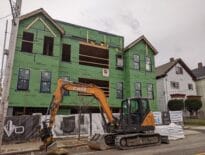
Malia Lazu
Not everyone is a change maker. Many people may want change, but have trouble actualizing it. Pushing against the status quo takes dedication to community, a belief in America’s promise and the confidence to lead.
Anyone who has moved the needle in equity work knows how important it is to have a group of leaders who are change makers and unafraid of shifting the system for the better. As Boston Mayor Michelle Wu builds her cabinet, she is letting the city know she means to make change. Her new head of economic development is a shining example of bringing in proven change makers to her administration.
Currently, Segun Idowu is the executive director of the Black Economic Council of Massachusetts (BECMA), a statewide business advocacy group with a focus on closing the wealth gap through business ownership and on whose board I formerly served. His work there has included raising millions in capital, getting it directly into the hands of women- and minority-owned businesses (WMBEs), while holding companies accountable on vendor diversity. To this point, BECMA is currently in the middle of a legal action regarding the city’s abysmal diversity vendor spending – only 4.8 percent of all city dollars spent on contracts go to WMBEs.
This appointment was applauded by many of those in business who have been left out of Boston’s prosperity. Segun is a well-known commodity, who has dedicated himself to progress equity. As BECMA founding board member Richard Taylor said, “Segun’s unparalleled success at BECMA bridging relationships between the black business community, corporate and government will serve him well in his new role in the Wu administration.”
Segun works in coalition to accomplish the greatest good for the most people, like when he and Grace Moreno from the LGBTQ Chamber called me when I was a Berkshire Bank executive vice president to discuss the need for friendly credit from banks to help WMBEs make it through the first few months of COVID lockdown, before the government had responded with the Paycheck Protection Program and other aid efforts. Their call and our work created the Futures Fund, a $3 million fund to support minority business.
Idowu’s appointment is a strong step forward in helping Boston build equity. As he told the Boston Globe’s Boston Black Newshour when he announced his appointment, “[The chief of economic opportunity and inclusion is] focused on making Boston a more equitable place to live and play and visit, and making sure we’re building wealth for all the people that live here. I’m looking forward to that because that was our work at [BECMA] and now we get to take it to City Hall.”
His expertise will help Boston make the changes it has pledged to do, especially after we were all embarrassed to see that the median Black families in our city had only $8 of wealth, versus the $247,500 of the median white family. The lack of wealth for people of color in Boston is directly connected to how Boston does business.
“Segun is the right guy for the moment. He has a total grasp of the issues and opportunities in the development community. We are all aware of how non-diverse the industry is especially in big projects and that should change,” said Darryl Settles, a managing partner at Catalyst RCP and another BECMA board member.
Change is coming to Boston City Hall, not just through the election of Mayor Wu but also by who she brings in to help her lead. Wu has ensured change makers are in her administration, change makers who have dedicated themselves to a more equitable Boston. As Segun said when I asked him about how BECMA feels about the divided nature of business support in the mayor’s race, “In the final analysis, the only candidate who had both a plan for greater inclusion in the economic prosperity of the city, but also a record of championing this, was Michelle Wu.”
Segun comes to his cabinet position with a public strategy for economic prosperity inclusion, one the business community has pledged to support when he was a nonprofit leader, and it will be exciting to see how those pledges can be actualized to greater prosperity for those who are most invisible in the city.
Malia Lazu is a lecturer in the Technological Innovation, Entrepreneurship and Strategic Management Group at the MIT Sloan School of Management, CEO of The Lazu Group and former Eastern Massachusetts regional president and chief experience and culture officer at Berkshire Bank.





